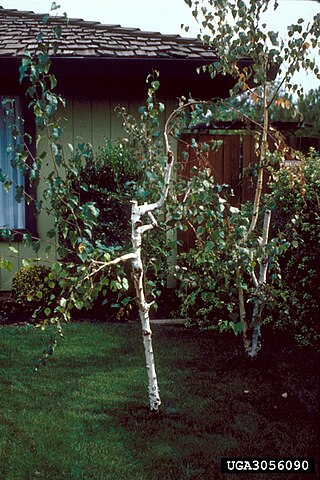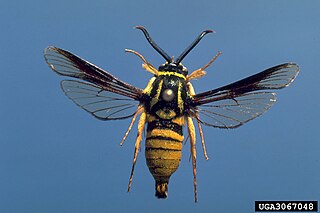
Futalognkosaurus is a genus of titanosaurian dinosaur. The herbivorous Futalognkosaurus lived approximately 87 million years ago in the Portezuelo Formation, in what is now Argentina, of the Coniacian stage of the late Cretaceous Period. The fish and fossilized leaf debris on the site, together with other dinosaur remains, suggest a warm tropical climate in Patagonia during this period.

Thestor brachycerus, the Knysna skolly, is a species of butterfly in the family Lycaenidae. It is endemic to South Africa.
Ardisia dukei is a species of plant in the family Primulaceae. It is endemic to Panama. It is also listed as endangered by the IUCN.

Paranthrene tabaniformis, the dusky clearwing, is a moth of the family Sesiidae. It is found in the Palearctic and Nearctic realms.

Chrysoritis felthami, the Feltham's opal, is a butterfly of the family Lycaenidae. It is found in South Africa. It was originally described by Roland Trimen under the name Zeritis felthami. This species was named in honour of Henry Louis Langley Feltham.
Lepidochrysops dukei, the Duke's blue, is a butterfly of the family Lycaenidae. It is found in South Africa, where it is found in the Western Cape.

Lognkosauria is a clade of giant long-necked sauropod dinosaurs within the clade Titanosauria. It includes some of the largest and heaviest dinosaurs known. They lived in South America and likely Asia during the Late Cretaceous period.

Paranthrene is a genus of moths in the family Sesiidae.

Paranthrene robiniae, the western poplar clearwing, is a moth of the family Sesiidae. It is found from sea level to near the timber line from Alaska southward along the Pacific Coast to southern California and throughout the Rocky Mountains into the desert southwest and as far east as Kansas and North Dakota.

Paranthrene simulans, the red oak clearwing borer, hornet clearwing or oak clearwing borer, is a moth of the family Sesiidae. It is found in eastern North America, from Nova Scotia to Florida, west to Minnesota, Missouri and Mississippi.
Paranthrene anthrax is a moth of the family Sesiidae. It is known from Sierra Leone.
Paranthrene chalcochlora is a moth of the family Sesiidae. It is known from Zambia.
Paranthrene mesothyris is a moth of the family Sesiidae. It is known from South Africa.
Paranthrene propyria is a moth of the family Sesiidae. It is known from Zambia.
Paranthrene thalassina is a moth of the family Sesiidae. It is known from Malawi.
Paranthrene xanthosoma is a moth of the family Sesiidae. It is known, from Uganda and Zimbabwe.
Paranthrene porphyractis is a moth of the family Sesiidae. It is known from Uganda.
Candiopella dukei is a species of snout moth in the genus Candiopella. It was described by Boris Balinsky in 1994 and is known from South Africa.

Paranthrene insolita is a moth of the family Sesiidae. It is found in large parts of Europe, Turkey, Iraq, the Levant, Israel and the Palestinian Territories.







